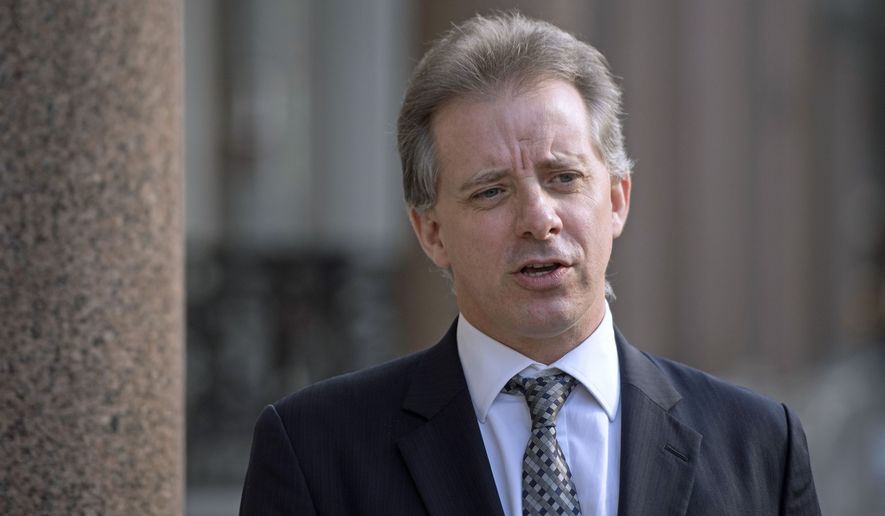Two pieces of evidence that have come together prove anti-Trump dossier writer Christopher Steele was the key source for a Yahoo News story that the FBI cited to support its wiretap application.
Identifying the source of that September 2016 article on Trump campaign volunteer Carter Page has taken on added importance in recent weeks.
First, Rep. Devin Nunes, California Republican and chairman of the House Permanent Select Committee on Intelligence, issued a declassified memo on Feb. 2. It said the FBI relied greatly on Mr. Steele’s discredited Democrat-financed dossier to obtain a surveillance warrant on Mr. Page.
To bolster the dossier’s charge that Mr. Page met with two Kremlin figures in Moscow, the FBI cited the Yahoo News article, which said the same thing.
But the Nunes memo said the FBI, in its Foreign Surveillance Intelligence Act application, wasn’t corroborating the dossier because the Page accusation in Yahoo came from the same source: Mr. Steele.
“The Carter Page FISA application also cited extensively a September 23, 2016 Yahoo News article by Michael Isikoff, which focuses on Page’s July 2016 trip to Moscow,” the memo states. “This article does not corroborate the Steele dossier because it is derived from information leaked by Steele himself to Yahoo News.”
Mr. Nunes cited Mr. Steele’s testimony, through his attorneys, in a London court case in which he is being sued for libel.
Then came a Democratic rebuttal from Rep. Adam B. Schiff of California, a leading dossier supporter.
Mr. Schiff, the House intelligence committee’s top Democrat, said Republicans failed to “cite evidence that Steele disclosed to Yahoo details included in the FISA warrant, since the British Court filings to which they refer do not address what Steele may have said to Yahoo.”
This assertion is important to Democrats. They are trying to bolster the FBI as it pursues collusion charges between the Trump campaign and Russia, and also support Mr. Steele, whose unverified accusations they have repeatedly cited.
The two pieces of evidence that say Mr. Steele was in fact the source:
⦁ In the London court case, Mr. Steele acknowledged that he came to the U.S. in September 2016 at the request of Fusion GPS, which paid him with Democratic Party money. He met with a number of major news representatives, including The New York Times and The Washington Post as he tried to sell his explosive charges. Included in Mr. Steele’s list of appointments was a meeting with Mr. Isikoff.
Mr. Isikoff subsequently wrote a story that matched the dossier. Both the dossier and the Yahoo story said Mr. Page met with two U.S.-sanctioned Russians, Rosneft oil chief Igor Sechin and Vladimir Putin aide Igor Diveykin. Mr. Isikoff sourced the information not to Mr. Steele but to a “Western intelligence source.”
Mr. Page, whose trip to Moscow was for a public speech at a university, has repeatedly denied under oath that he met the two men. The former Moscow resident and energy investor has decried the investigation into him, including the nearly one-year-long wiretap, which he says found no wrongdoing.
⦁ After Mr. Schiff wrote his rebuttal to the Nunes memo on Jan. 31, Mr. Isikoff, a longtime journalist in Washington with a number of scoops to his credit, posted an edition of his podcast, “Skullduggery,” on Feb. 2. Through the Nunes memo, Mr. Isikoff had just learned and said he was surprised that the FBI relied on his article before the FISA court judge.
He told about being summoned by his “old friend,” Fusion GPS co-founder Glenn Simpson, to a private room in a Washington hotel to meet the former spy from Britain.
“Steele tells me an amazing story,” Mr. Isikoff said. “One of Donald Trump’s foreign policy advisers, Carter Page, had flown to Moscow and held private talks with close associates of Vladimir Putin about lifting U.S. sanctions against Russia. And Steele tells me something else that day that gets my attention. He has taken this information to the FBI, and the bureau is very interested. Why were they interested? What did the bureau know that would prompt them to take the next step of launching an investigation into an adviser to the Republican nominee for president?”
Mr. Isikoff subsequently wrote the article that ended up in the FBI’s FISA petition. His podcast sealed the case for Mr. Nunes.
This prompts the question: Why did the FBI believe that the dossier section about Mr. Page and the Isikoff article came from collaborating sources?
The answer lies in a declassified referral sent to the Justice Department from Senate Judiciary Committee Chairman Chuck Grassley, Iowa Republican, and Sen. Lindsey Graham, South Carolina Republican.
The two said the evidence suggests that Mr. Steele lied to the FBI when he denied being the source. They have asked the Justice Department to investigate him.
“The FBI repeatedly represented to the court that Mr. Steele told the FBI he did not have unauthorized contacts with the press about the dossier prior to October 2016,” the senators’ referral said. “The FISA applications make these claims specifically in the context of the September 2106 Yahoo News article. But Mr. Steele has admitted — publicly before a court of law — that he did have such contacts with the press at this time and his former business partner Mr. Simpson has confirmed it to the committee.”
The referral says that the FBI either submitted false information or “Mr. Steele made materially false statements to the FBI when he claimed he provided the dossier information only to his business partner and the FBI.”
• Rowan Scarborough can be reached at rscarborough@washingtontimes.com.




Please read our comment policy before commenting.